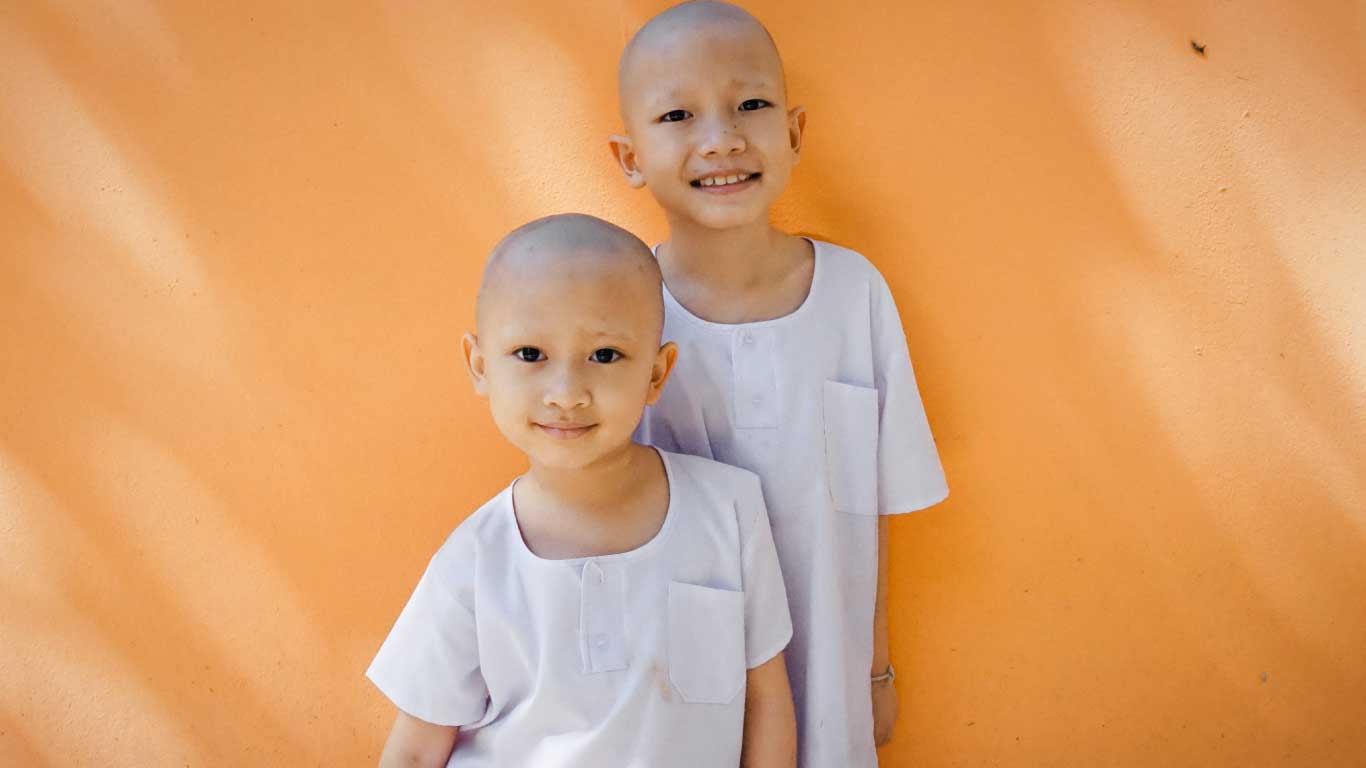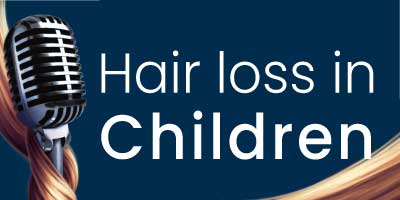Hairs To You Podcast: Hair loss in children and how parents should approach it
Posted by Superhairpieces on Sep 15, 2022
Diving further into the topic of hair loss and how it affects our mental health, Hairs To You podcast guest Dr. Monica Vermani talks about hair loss in children, when it starts to affect them and how parents should deal with the situation.
READ: Part 1 - Hairs To You Podcast: Why mental health is so prominent today
READ: Part 2 - Hairs To You Podcast: Mental health and which gender is affected more by hair loss
If you prefer, you can also listen to the full episode below:
We were at CANAAF (Canadian Alopecia Areata Foundation) and noticed there were a lot of bald kids which was surprising even for us. Is hair loss in a child harder for them than when they’re getting older? Or are they more accepting of it since they are younger and less judgemental? Should parents pay attention to how their child is dealing with hair loss?
Monica Vermani: Children do have comparisons of one another and yes, I agree with you when we're younger, we are in a place of like more living in the here and now, meaning we're not in our head overanalyzing. Like when you're living in the present moment, you simply experience, do, act and you're connected to your senses and you're really here and you're not thinking. When your mind then takes you to the past, you start comparing yourself to who I was. And you start comparing yourself to things that used to be there and you might have regrets, ‘oh, I wish I did this. I wish I did that.’ Or your mind goes to the future and it starts catastrophizing or forecasting worse case scenarios, further hair loss, or looking different or being different or worries. What if this happens? What if that happens?
So anxiety and depression is when your head goes for the future or the past, but in the here and now, you're better able to manage things. Kids live better in the here and now. Kids and pets are excellent at being in the present moment. And that's one reason why they're not that judgemental because they're in a place of being in the here and now. They're connected to their senses. They're playing, they're jumping, they're doing things. And even if you're like, ‘we're going to Walt Disney world next week,’ they're like, ‘okay’ and then they'll go back to pots and pans or playing. They'll go back to what they were doing. So kids are a little bit better at adjusting because they go back to the here and now.

Now don't get me wrong. As we age, we start living in our heads more and we start going to comparison or forecasting. And that's where the problems start coming in. That's where we start judging ourselves as different from others or less than others. And there's more criticism and self scrutiny that comes in as we age. So yes, as children, children adjust better and they have their own concerns and worries because they are still comparing themselves. But the environment around them, the nurturing around them is actually what influences them to cope better or not. So the parenting, the support, the feeling normalized, letting them focus on the goods over the bad. So I think your environment has a lot to do with it. As we're older, we don't have our parents and our environment affecting us as much. We're more affected by ourselves more. So we have to work on our own headspace. And so, as we're older, if you, what you focus on expands. If I focus on self scrutiny, judgment, criticism, that's going to expand and really monopolize my days. Or if I focus on positivity and being positive, looking at what I have versus what I lack, then that's going to expand. But when you're older, your social network or the people you rely on for support for coaching gets lessened a little bit, unless you reach out and get the help. So as children, we have a network and if our network is solid, positive, strong, we adjust even better, but kids know how to live in the here and now so they do sometimes appear to adjust better, but they do wobble in and out of thoughts that can be hurtful and self critical and insecure. And as we get older, we live so much in our heads that it is harder for us to dispel negative thoughts. So getting help from a therapist or working with friends and communicating what you're really going through, instead of just sucking it up and pushing through, is important.
Because as adults, again, you can still take control of your thoughts and focus on positives of what's working and how to make a situation that's difficult, a little bit more pleasant, or take the edge off it, and what you focus on expands in your life. So it's really up to us choosing to bring in factors that make us healthier and with children, hopefully parents are providing that support to make them feel courageous, to deal with whatever challenges in a way that they feel stronger and more capable. So again, anxiety is about, ‘am I capable to handle things?’ And children rely on parents for many things. So your parents making you feel like ‘I got your back, we're capable’ helps them really adjust well.
How should parents approach a hair loss situation for their children if the child doesn’t see it as a big deal?

Monica Vermani: So the key is as children, like I mentioned, we live in the here and now, and then as you're growing, you're also influenced by your parents in that home environment. I call them blueprints, right? When you're born in a family unit, you're imprinted by the way your parents think and feel. And many times, our parents have anxiety that we take on as ours. So many times anger, anxiety is learned behavior. And so as parents, we have a sense of responsibility to kind of look at our own selves, pause and reflect and recognize, ‘okay, the first step to treatment is awareness. I need to have awareness of how my issues spill over onto my kids and the unit that I'm raising here in my household.’ So it is important for us to recognize our own anxieties, our own fears that we project onto our own family members and children that they take on and they hold on and affects them.
So when it comes down to it, kids are adjusting well. Like when a kid falls, when the parent's like, ‘oh!’ then the kid gets even nervous like, ‘oh my God, I fell. This is not good.’ But if the parents are like, ‘hey, get up, move on. No big deal. Right? Correcta and continue. Then that child feels like, ‘oh, not a big deal. We fall in life and we pick ourselves up and we move on.’ So this is all about model behavior. And us as parents have a huge responsibility to raise our kids with this level of awareness that life only gives you what you can handle. Our biggest problem in today's society is we feel incapable of handling stressful situations. The reason why mental health is on a high, mood and anxiety is on a high, is we don't feel capable of handling the uncertainty that shows up in our lives.
The pandemic fueled this too, because many times again, you're worried about the next problem and can I handle it? But if you feel like, ‘good or bad, bring it on, life only gives me what I can handle.’ There's this sense of capability, that to date, whatever shows up in my life, I've handled it. And each and every one of us who are watching this show, same thing. If you look at and reflect at your life, even though you're afraid of not being able to handle something, to date, you're standing, you're here, you've been able to handle whatever shows up. That's what we teach our kids. That's what we have to teach ourselves and reinforce that no matter how bad it gets, no matter what shows up, life only gives me what I can handle because to date, life has shown me through my own evidence that I've handled everything.
When you can teach your kid how to just remove self doubt and feel capable to handle, or will figure it out together and handle it well, that sense of ‘I am capable’ is really all somebody needs. The rest we’ll figure it out. And so, our parents need to start watching their own mood and anxiety. You know, it's not the kid. The kid's doing great and the kid only does as well as we teach them to do. Our job as parents is when our kids are anxious, what am I modeling to them? What should I be modeling to them? How do I reconceptualize and reframe thoughts that they have that they're powerless or can't handle it, or can't manage it and make them feel empowered. ‘I'm capable. I can handle whatever shows up. And if I don't have the answers, I'll go out there and find it. Or my parents will help me find it. We'll do it as a team.’ We're not alone in the world and I think that's one reason why as adults, we struggle more with difficulties in life. We sometimes feel individualistic and alone, but we're in a collective, there's resources, there's people to rely on, there's therapists out there. It's important for us to teach our kids that even if you don't have the answers, go out there and find them and find people who can help you find them. You are capable, even if you don't know the answers yourself. And I think that's what we have to reinforce with children and children become mini-us. And so, we do have to look at our own stuff. I'm always all about teaching parents that you have to reflect on what symptoms you have and you need to address them in order for our children to be in an environment that help them thrive and feel capable to manage whatever shows up.
-----Stick around as the next blog will see Vermani discuss why people feel the need to make comments or remarks on non-surgical hair replacement systems and appearances in general!
You can also listen to the full podcast on YouTube below:
------------------------------------
Interested in learning more about getting started with hair systems? Browse through our website at www.superhairpieces.com (US & International) or superhairpieces.ca (CAN)
Don’t forget to tag us at @Superhairpieces and #Superhairpieces on your social media channels to get a shoutout! And make sure to like us on Facebook, follow on Instagram and subscribe to our YouTube channel!
 Likes
Likes



 GBP
GBP










